In the arms of an angel

The Wenchuan earthquake 10 years ago caused a seismic shift in the lives of millions in Sichuan province. Dara Wang discovers how the tremors continue to reverberate through the life of one courageous survivor.
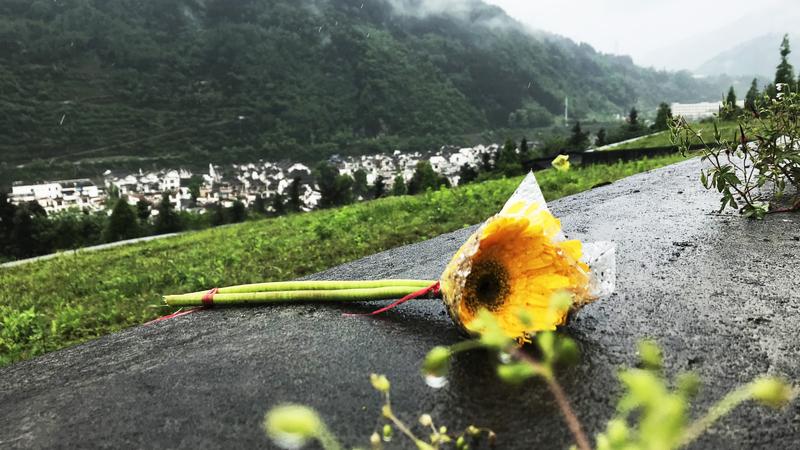
There was blackness all around. Zhou Yuye couldn’t move. She lay trapped, in the death grip of someone who had died, under debris that had fallen from the ceiling and crushed her under its weight, making breathing difficult.
“I was on my stomach, my arms stretched out in front. My left one was caught tight between something,” Zhou said. “Someone’s arm hugged my right shoulder. It was deadly tight and made me uncomfortable. I wanted to move it, but I couldn’t.”
Zhou, a 7-year-old Grade-2 student at Yingxiu Primary School, faced the specter of the end of her life. It was May 12, 2008.
At dusk on the evening of May 13, 27 hours after the catastrophe, rescuers found Zhou and another student in the embrace of lifeless teacher Zhang Miya, 29, as if the children were enfolded in the wings of an angel. Zhang had held the two surviving children so tightly that rescuers had to saw off his arms to set the children free.
Zhang was one of the 80,000 people who died in the Wenchuan earthquake. The school where Zhang taught sat right at the epicenter of the magnitude-8.0 quake.
Zhou remembered the moments leading up to the disaster. It was close to 2:28 pm on that fateful day. Zhou had been in math class, memorizing multiplication tables. There was a tremendous crash outside the classroom window. The world began to roll and shudder.
Vague memories come back to Zhou of her teacher shouting, “There’s an earthquake — get under the (teacher’s) desk!”
“I saw a huge gray wave rushing at me. I was dumbstruck,” Zhou recalled. She forced a smile as she told her story, but it quickly vanished. “I didn’t know what was happening. I didn’t know what an earthquake was,” she sobbed.
Zhou did as commanded and ran toward the desk. “The ceiling started falling piece by piece.”
She has no memory after that. She lay unconscious and was awakened to the sound of voices of other surviving students crying out for help. She could barely move. Breathing was difficult and there was excruciating pain in her crippled arm.
She remembers, in the blackness, a container of yogurt being pressed into her hand. She took only a little before passing the container to another student. It was the first time she’d had sustenance since the previous afternoon.
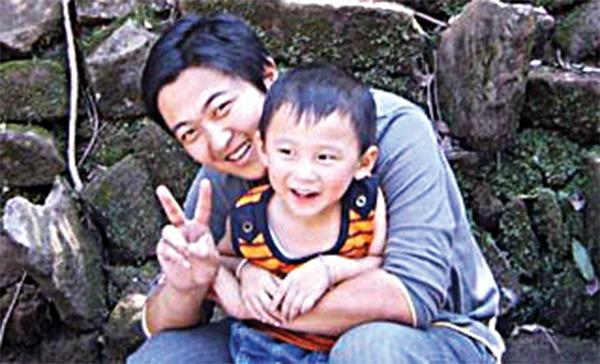
She tried to buoy her spirits and those of her surviving classmates by leading a song taught to them by Zhang only a week earlier. The song may have saved them in the end — rescuers heard the children singing and after six to seven hours of hard effort they pulled three of Zhou’s classmates to safety.
At the end of her peril, Zhou thought only a few hours had passed. Her first words to her mother Yu Qin were: “I want shredded pork with green peppers.” It was her favorite dish. Her father had promised that he would cook it for her on the day the quake struck. Her father would not be able to keep the promise.
Coming out of the dark
Zhou Lunju, also a teacher at the Yingxiu Primary School, did not survive. His colleague and his students told how he had dashed from the computer resources room, passed two exits to reach his classroom and exhorted his pupils to run for their lives. It took three days before searchers recovered his body from the doorway of his classroom.
Zhou’s mother Yu, also a teacher at the school, had joined the frantic rescue, toiling for three days, then hurrying to the hospital in Chengdu where Zhou Yuye was being treated.
The days following the disaster seemed barely real to the girl, with the loss of her father, her teacher and friends, her school and community, and the excruciating pain in her arm.
Avascular necrosis had destroyed Zhou’s left forearm and it had to be amputated. At first she couldn’t feel it. Then phantom limb syndrome set in along with itch and pain. “I asked my mom to scratch for me. She only cried,” Zhou said.
Two months later Zhou watched from a hospital ward in Beijing where she was undergoing physical therapy as her desk mate, Lin Hao, was held aloft at the opening ceremony of the Beijing Olympics by Chinese basketball player Yao Ming. Lin had been credited with saving two of his classmates from the devastation.
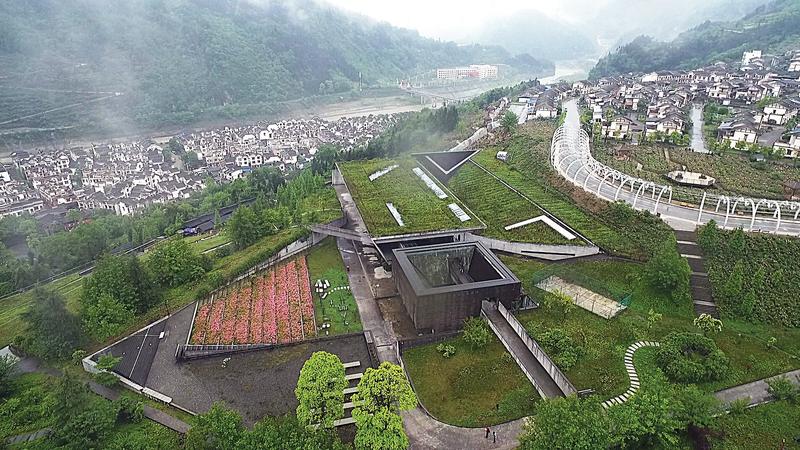
A month later, Zhou attended the opening ceremony of the Paralympics and was among the third group of students celebrated by the Ministry of Education for their courage during the earthquake. Several days later, Zhou was back in Sichuan attending school.
Of the school structure itself, nothing remained but scattered ruins. About half of its 473 students had died; 27 of the 47 teachers never again saw the light of day. Only a flagpole, from which the national flag fluttered in silent tribute to the dead, remained standing.
Zhou and her mother Yu do not know precisely where Zhou Lunju was buried. Each year they attend a mass grave outside the 5.12 Wenchuan Earthquake Epicenter Yingxiu Memorial. Many of the victims are buried there, commemorated by an immense stone on which are inscribed the names of the victims.
Falling silent, Zhou and her mother paused to remember a father and husband, and Zhou’s teacher Zhang.
Zhou’s memories of her teacher are fond ones. She still remembers the warmth of his smile. Zhang was “very nice to every student, like a brother”. She recalled going to Zhang’s home and playing video games with his son.
Zhou said it was only natural that he would have stayed and done his best for his students. The idea that he might have fled for his own safety was unthinkable.

Shadow of disaster
“Ten years have passed. Many people seem to have forgotten the earthquake,” said Zhou, who is now a Grade-2 student at a high school in Dujiangyan, Sichuan province. Many students there did not experience the full strength of the earthquake.
“Students made fun of my cosmetic arm behind my back. That made me feel hurt and inferior,” Zhou said.
Her prostheticist Ho Kam-wa, from Hong Kong charity Stand TALL, showed great concern for her. Ho, who has known Zhou since October 2008, created a cosmetic prosthetic arm for her free of charge. Ho checked Zhou’s condition once a month at the beginning, then every two months, now every three months.
“Ho always talks to me in a gentle way. He has taken good care of me for 10 years,” Zhou said.
Knowing Zhou pays attention to her appearance and cares about how others see her, Ho said a bionic arm will make her life easier and won’t attract attention from curious strangers.“She will soon start university and enter society,” Ho said. “The cosmetic arm cannot meet her needs any longer.”
Ho recently asked a prosthetics maker, Alex Xie Yi from Ossur, to make a bionic arm for Zhou, with realistic translucent skin very close in appearance to a natural arm.
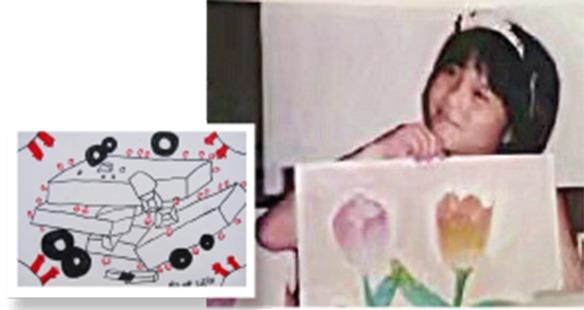
Ossur has been cooperating with Stand TALL to provide free bionic arms to earthquake survivors who had undergone amputations. Xie explained that signals sent from the wearer’s brain to nerve-endings in the muscles prompt movement of the prosthesis. Each finger has a separate motor so wearers can move their fingers individually.
After trying the bionic arm, Zhou was excited. “I can tie up my hair or lace up my shoes! I do not need to ask others for help anymore.”
However, Zhou cannot wear her bionic arm immediately. When Xie tested the single remaining muscle in her arm, he found it is not yet strong enough to operate the bionic arm.
“She has not used her left arm for 10 years. It takes time for her body to get used to the movement,” Xie said. “Also, only a part of her elbow was kept. That means she cannot bend her arm over 90 degrees.”
Xie has instructed Zhou to do bending exercise twice a day for an hour each time. He will check Zhou’s progress in three weeks. He hopes the bionic arm will restore Zhou’s mobility to some extent.
However, for Zhou and other survivors trying to escape the shadow of the earthquake, physical aids alone may not be enough.
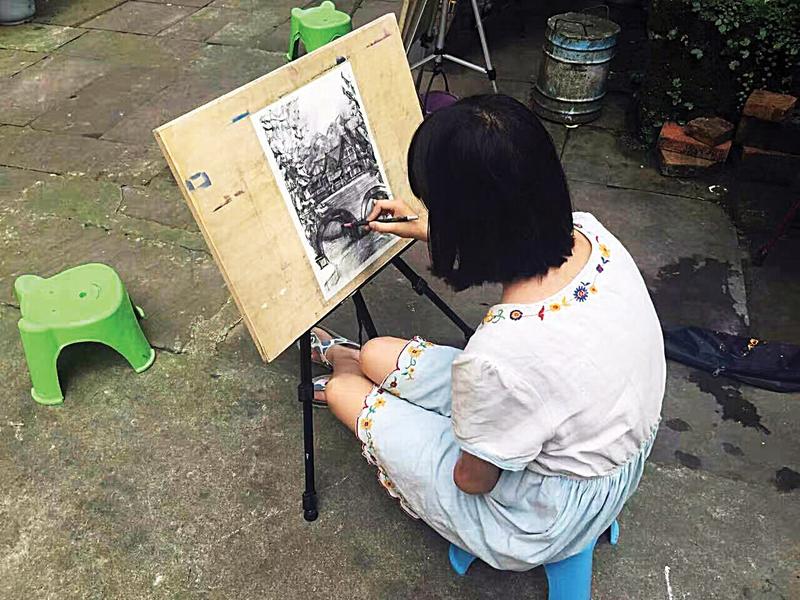
Zhou thought she had moved on from the shattering experience after the first few years, but now feels the shadow returning. Every time she thinks about the miserable scene of the earthquake she cries and feels dizzy. In crowds she feels disoriented, as if thrown back into the midst of her ordeal. Even taking a bus, because of the motion, makes her uneasy.
She has not seen any mental health professionals since two weeks after the quake in 2008.
Timothy To Wing-ching, executive director of the Post Crisis Counseling Network in Hong Kong, said Zhou may be suffering from a trauma-related mental disease. “The disease can induce serious physical problems and even make people commit suicide,” he said, adding many Chinese people lack knowledge and awareness of it.
“Time will not heal all wounds,” To confirmed. He stressed those who have experienced severe trauma, like Zhou, need the help of professionals.
Zhou will become an adult 11 days after the 10th anniversary of the quake on Saturday. She is already celebrating on WeChat. She loves painting and her ambition is to study art at university. She is busy preparing for entrance exams.
“I want to marry a man like (Hong Kong entertainment celebrity) Shawn Yue Man-lok, a cool and gentle guy,” she smiled.
Contact the writer at dara@chinadailyhk.com
- Haunted by the horror
- Man thanks hospital 10 years after losing calf in quake
- New births bring hope to families after quake
- Book on post-quake lives of teenager survivors published
- Wenchuan shows effects of ecological restoration after 10 years: Report
- Kids born at temple after Wenchuan quake reunite in film
- International students immerse in TCM culture at Shanghai university event
- New train schedule announced to enhance international freight services
- New high-speed railway line opens in Anhui
- Regulators launch campaign targeting misuse of language online
- Legal disputes involving elderly increase in Beijing
- PLA Navy fleet conducts realistic training in East China Sea


































